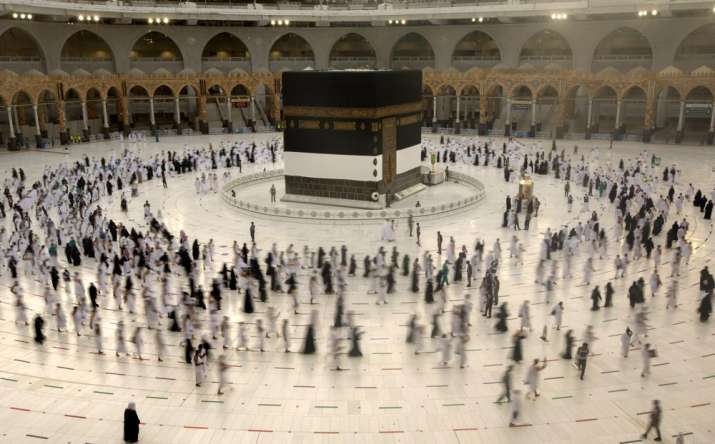
Muslim pilgrims circumambulate the cubic building at the Kaaba, the Grand Mosque, a day before the annual Hajj pilgrimage, as they wear masks and maintain social distancing.
Thousands of vaccinated Muslim pilgrims circumambulated Islam’s holiest site in Mecca on Sunday, but socially distanced themselves and wore masks as the coronavirus takes its toll on the Hajj for the second year running. The Hajj pilgrimage, which once attracted around 2.5 million Muslims from all walks of life from across the world, is now almost unrecognizable. Due to the coronavirus pandemic, it is being extended back for the second year in a row.
The pared-down Hajj prevents Muslims outside Saudi Arabia from fulfilling an Islamic obligation and has caused financial losses to Saudi Arabia, which in pre-pandemic years took in billions of dollars as custodians of holy sites. Islamic pilgrimages last about five days, but traditionally Muslims begin arriving in Mecca weeks ahead of time. The Hajj culminates with the Eid al-Adha celebration, which is marked by the distribution of meat to the poor around the world.
This year, 60,000 vaccinated Saudi citizens or residents of Saudi Arabia have been allowed to perform Hajj due to ongoing concerns around the spread of the coronavirus. Less than 1,000 people from within the state participated in the first year’s largely symbolic Hajj.
It is unclear when Saudi Arabia will host millions of Muslims again. There are no clear standards for vaccine passports in the state, vaccination rates are uneven in different countries and new forms of the virus threaten the progress already made in some countries.
The kingdom’s Al Saud rulers have largely staked their legitimacy on their patronage of Hajj sites, making them a unique and powerful platform among Muslims around the world. Despite the changes caused by the pandemic, the state has gone to great lengths to ensure that the annual Hajj continues uninterrupted.
Robots have been deployed to spray disinfectant around the busiest streets of the cube-shaped Kaaba. The Kaaba is where the Hajj pilgrimage begins and ends for most.
Saudi Arabia is also testing a smart bracelet this year in collaboration with the government’s Artificial Intelligence Authority. The touchscreen bracelet resembles the Apple Watch and includes information on Hajj, a pilgrim’s oxygen level and vaccine data, and has an emergency feature to call for help.
International media outlets already in the kingdom were allowed to cover Hajj from Mecca this year, but others were not allowed to fly, as was the practice before the pandemic.
Cleaners are cleaning the huge white marble spaces of the grand mosque in which the Kaaba takes place several times a day. “We are sanitizing the floor and using disinfection fluid while cleaning two or three times during (each) shift,” said Olis Gul, a sweeper who has been working in Mecca for 20 years.
Hajj performed once in a lifetime is one of the most important requirements of Islam. It follows the path set by the prophet Muhammad about 1,400 years ago and is believed to eventually follow in the footsteps of the prophets Ibrahim and Ismail, or Abraham and Ishmael as their names appear in the Bible.
Hajj is seen as an opportunity to cleanse past sins and bring more unity among Muslims. The sectarian spirit of more than two million people around the world – Shia, Sunni and other Muslim sects – praying together, eating together and repenting together has long been part of making the Hajj both a challenging and transformative experience.
There are questions about whether Hajj will again be able to attract such a large number of faithful, male pilgrims dressed in white terrycloth form a sea of white, symbolizing the equality of mankind before God and Women shun makeup and perfume to focus on the inside.
Like last year, the pilgrims would be drinking water in plastic bottles from the well of the holy Zamzam. They were given umbrellas to protect them from the sun. They will have to carry their own prayer rugs and follow a strict schedule through a mobile app that informs them when they can be in certain areas to avoid crowds.
“I hope it is a successful Hajj season,” said Egyptian pilgrim Eli Abulnaga, a university lecturer in Saudi Arabia. “We ask God to accept everyone’s Hajj and to keep the area open to as many pilgrims as possible and to return in a better condition than ever before.”
Before the outbreak of COVID-19, the kingdom was working to expand Mecca’s capacity to host pilgrims with the expansion of the $60 billion Grand Mosque. On the south side of the mosque is the 1,972-foot (600-m) clock-tower skyscraper, part of a complete seven-tower complex that was built to accommodate wealthy pilgrims.
The state, with a population of over 30 million, has reported over half a million cases of the coronavirus, including over 8,000 deaths. According to the World Health Organisation, it has delivered nearly 20 million doses of coronavirus vaccines.
Read also: Afghanistan recalls Pakistan’s ambassador, senior officials after ambassador’s daughter abducted
Read also: Pakistani fighters, Taliban directed to target Indian-made assets in Afghanistan
.